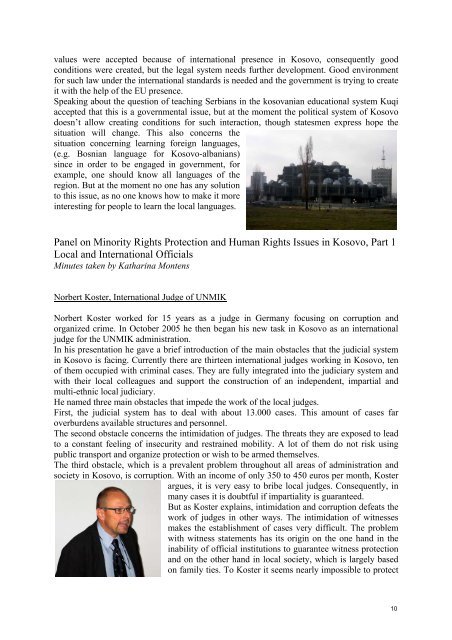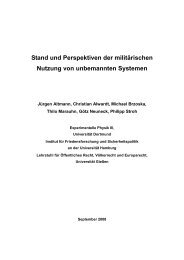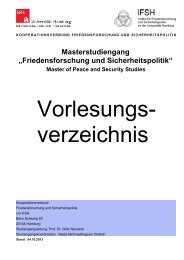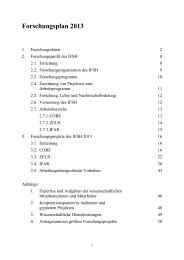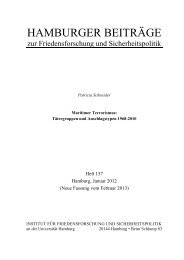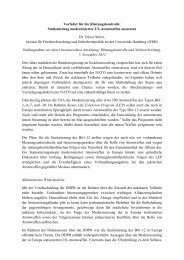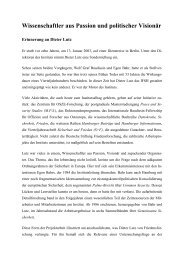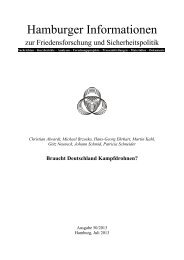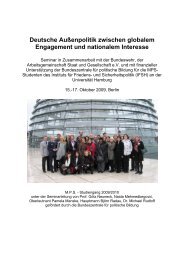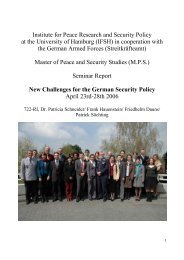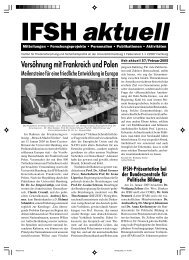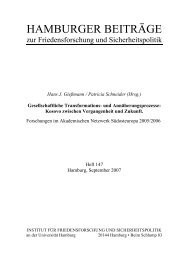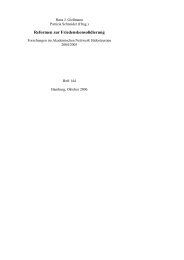Minority Rights Protection and Human Rights Policies in ... - IFSH
Minority Rights Protection and Human Rights Policies in ... - IFSH
Minority Rights Protection and Human Rights Policies in ... - IFSH
Create successful ePaper yourself
Turn your PDF publications into a flip-book with our unique Google optimized e-Paper software.
values were accepted because of <strong>in</strong>ternational presence <strong>in</strong> Kosovo, consequently good<br />
conditions were created, but the legal system needs further development. Good environment<br />
for such law under the <strong>in</strong>ternational st<strong>and</strong>ards is needed <strong>and</strong> the government is try<strong>in</strong>g to create<br />
it with the help of the EU presence.<br />
Speak<strong>in</strong>g about the question of teach<strong>in</strong>g Serbians <strong>in</strong> the kosovanian educational system Kuqi<br />
accepted that this is a governmental issue, but at the moment the political system of Kosovo<br />
doesn’t allow creat<strong>in</strong>g conditions for such <strong>in</strong>teraction, though statesmen express hope the<br />
situation will change. This also concerns the<br />
situation concern<strong>in</strong>g learn<strong>in</strong>g foreign languages,<br />
(e.g. Bosnian language for Kosovo-albanians)<br />
s<strong>in</strong>ce <strong>in</strong> order to be engaged <strong>in</strong> government, for<br />
example, one should know all languages of the<br />
region. But at the moment no one has any solution<br />
to this issue, as no one knows how to make it more<br />
<strong>in</strong>terest<strong>in</strong>g for people to learn the local languages.<br />
Panel on <strong>M<strong>in</strong>ority</strong> <strong>Rights</strong> <strong>Protection</strong> <strong>and</strong> <strong>Human</strong> <strong>Rights</strong> Issues <strong>in</strong> Kosovo, Part 1<br />
Local <strong>and</strong> International Officials<br />
M<strong>in</strong>utes taken by Kathar<strong>in</strong>a Montens<br />
Norbert Koster, International Judge of UNMIK<br />
Norbert Koster worked for 15 years as a judge <strong>in</strong> Germany focus<strong>in</strong>g on corruption <strong>and</strong><br />
organized crime. In October 2005 he then began his new task <strong>in</strong> Kosovo as an <strong>in</strong>ternational<br />
judge for the UNMIK adm<strong>in</strong>istration.<br />
In his presentation he gave a brief <strong>in</strong>troduction of the ma<strong>in</strong> obstacles that the judicial system<br />
<strong>in</strong> Kosovo is fac<strong>in</strong>g. Currently there are thirteen <strong>in</strong>ternational judges work<strong>in</strong>g <strong>in</strong> Kosovo, ten<br />
of them occupied with crim<strong>in</strong>al cases. They are fully <strong>in</strong>tegrated <strong>in</strong>to the judiciary system <strong>and</strong><br />
with their local colleagues <strong>and</strong> support the construction of an <strong>in</strong>dependent, impartial <strong>and</strong><br />
multi-ethnic local judiciary.<br />
He named three ma<strong>in</strong> obstacles that impede the work of the local judges.<br />
First, the judicial system has to deal with about 13.000 cases. This amount of cases far<br />
overburdens available structures <strong>and</strong> personnel.<br />
The second obstacle concerns the <strong>in</strong>timidation of judges. The threats they are exposed to lead<br />
to a constant feel<strong>in</strong>g of <strong>in</strong>security <strong>and</strong> restra<strong>in</strong>ed mobility. A lot of them do not risk us<strong>in</strong>g<br />
public transport <strong>and</strong> organize protection or wish to be armed themselves.<br />
The third obstacle, which is a prevalent problem throughout all areas of adm<strong>in</strong>istration <strong>and</strong><br />
society <strong>in</strong> Kosovo, is corruption. With an <strong>in</strong>come of only 350 to 450 euros per month, Koster<br />
argues, it is very easy to bribe local judges. Consequently, <strong>in</strong><br />
many cases it is doubtful if impartiality is guaranteed.<br />
But as Koster expla<strong>in</strong>s, <strong>in</strong>timidation <strong>and</strong> corruption defeats the<br />
work of judges <strong>in</strong> other ways. The <strong>in</strong>timidation of witnesses<br />
makes the establishment of cases very difficult. The problem<br />
with witness statements has its orig<strong>in</strong> on the one h<strong>and</strong> <strong>in</strong> the<br />
<strong>in</strong>ability of official <strong>in</strong>stitutions to guarantee witness protection<br />
<strong>and</strong> on the other h<strong>and</strong> <strong>in</strong> local society, which is largely based<br />
on family ties. To Koster it seems nearly impossible to protect<br />
10


